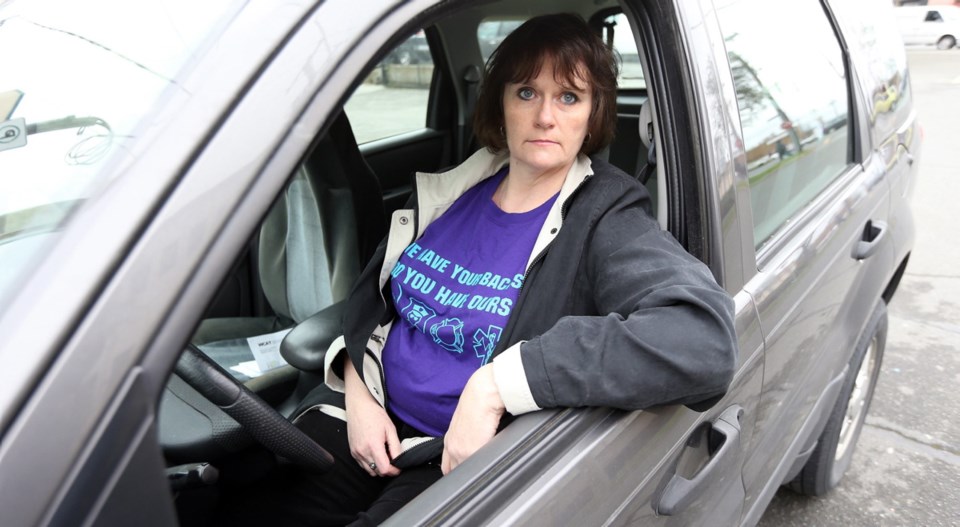Lisa Jennings cried tears of happiness and relief Tuesday after learning that WorkSafe B.C.’s appeal tribunal has taken her side in a longstanding fight for compensation.
Jennings, 51, said the move reverses three decisions by WorkSafe discounting her claim that she suffered post-traumatic stress on the job as a paramedic in 2014.
“I’m stunned,” she said, especially since she had been told on Monday that the decision would be delayed.
She said a letter signed by the vice-chair of the independent tribunal concluded that she had indeed suffered a mental health issue, PTSD.
The letter said it “was a reaction to a traumatic event arising out of and in the course of her employment on June 15, 2014.”
The PTSD was rooted in an assault that occurred when she was responding to a physically fragile woman with a history of cardiac problems, who experienced severe pains while in a Victoria store.
After the incident, Jennings experienced suicidal thoughts and flashbacks.
The appeal tribunal’s decision “has to make a difference,” she said. “I’m feeling validated for the first time.”
Fighting tears, she added: “This is for all the first responders in B.C.”
She said she hopes her hard-won victory will assist other first responders who run up against WorkSafe B.C. regulations that require them to prove that their PTSD was caused by their work.
In five other provinces and Yukon, legislation has been passed that deems PTSD claims by first responders work-related unless proven otherwise — legislation Jennings hopes will one day be in place in B.C. Ontario unanimously passed such a law in 2016 as a result of a private member’s bill.
A private member’s bill last year in B.C., sponsored by NDP labour critic Shane Simpson, did not get far. Jennings attributed that to Labour Minister Shirley Bond’s belief that the current system is adequate in dealing with PTSD claims.
In a recent statement, Bond said B.C. has some of the “broadest workers’ compensation legislation for mental disorders in Canada.”
Bond’s ministry did not respond to a request for comment about the status of legislation regarding PTSD.
The current B.C. law holds first responders to a higher standard than the average worker when it comes to PTSD, Jennings said, “because we’re supposed to be used to it.”
Paramedics filed 95 mental-disorder claims in 2015. Of those, 13 PTSD cases were accepted, WorkSafe figures show.
The earlier WorkSafe rejections that Jennings experienced led to financial distress that, at one point, had her living in her car. The tribunal was her final route for appeal, and had it been rejected, she would have had to hire a lawyer and fight the decision in court.
“And on $966 a month, that was impossible,” said Jennings, who lives on a B.C. disability pension of $966 per month.
She said she expects that she will now qualify for higher compensation payments from WorkSafe.
It’s when faced with the rejection of their PTSD claims and the prospect of going to court that first responders take their own lives, said Jennings, who tracks their deaths on a website called You Are Not Alone.
Of the 19 suicides recorded last year in B.C. among police, firefighters and paramedics, as many as 16 of them had WorkSafe claims denied, Jennings said, citing conversations with their families.
Two first responders have taken their own lives already this year, she said.
Jennings’ campaign is supported by police and firefighters’ unions, the B.C. Government and Service Employees’ Union and dozens of municipalities.
According to the Tema Centre Memorial Trust, which focuses on PTSD and operational stress injuries, B.C. has Canada’s highest rate of PTSD-related deaths among first responders.
A spokeswoman for WorkSafe B.C. said that the tribunal’s first obligation is to inform Jennings. Once WorkSafe has been formally notified of the decision by the tribunal, staff will move forward with respect to implementation, she said.
Jennings has consistently refused to publicly identify her former employer and declined to name the official who signed her appeal paper, but sounded clearly overjoyed that her 16-month wait for a decision was finally over.
Her painful odyssey began when her claim for work-related stress was rejected, despite a letter from a psychologist attesting to it, on the grounds that it did not meet the criteria for mental health trauma.
Jennings moved from Alberta to B.C. in 1997 and saw a counsellor a couple of times for issues such as the deaths of her parents and brother in quick succession. This was used by WorkSafe to label her as having “a well-documented psychiatric history,” she said.
Jennings, who quit law school to become a paramedic in 1993, wrote her own brief for the tribunal. She still suffers and is not able to work, she said. “I’m still having flashbacks of this assault.”
But she has a message for others facing an uphill climb: “Don’t ever give up on yourself. Don’t let anybody or any organization take your integrity.”



